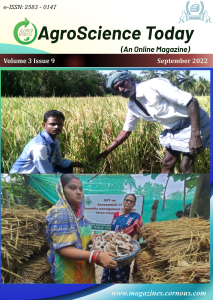Tamil Nadu is the major Paddy grown state in India. The total area under Paddy cultivation is 21.65 lakh hectares in Tamil Nadu. 74.7 % of Paddy cultivation under Samba (Aug- Jan) season. Tamil Nadu is the fourth Major state in Paddy Production. The major Paddy Growing Area in the Tamil Nadu is Villupuram, Nagapattinam, Thiruvarur, Thanjavur and Thiruvannamalai districts. The total Paddy production in Tamil Nadu was 74 lakhs tonnes. The average production per hectare in Tamil Nadu is 3494 kg/ha. There was an urgent need to reduce water consumption and implement the good agricultural practices for rice cultivation while enhancing productivity. CO 51 Paddy variety was shorter duration with 110 days duration with white medium slender grains. Split application of Nitrogenous fertilizer, installation of pheromone traps, Drought mitigation strategies and Integrated Disease management technologies implementation increase the yield. Foliar application of PPFM reduces the rate of evapo transpiration and increase the Shoot growth. These technologies will be a step forward in increase the Paddy yield. The installation of pheromone trap used for monitoring the yellow stem borer incidence and reduce the incidence up to 12 %. Application of methylobacteria reduces the evapotranpiration rate and increases the crop withstand ability. The yield obtained from demonstrated plot was 78 q/ha. This was higher 16 % higher than farmers practice.
Over the past decades, a large amount of scientific data has been generated, especially in the fields of genomics and molecular biology. Bioinformatics, an interdisciplinary scientific field that applies information technology in the form of advanced computational tools, can be effectively used to the processing and management of biological data. Biological and agricultural sciences have evolved into data-driven sciences due to extraordinary technological innovations over the last few decades. The opportunities, challenges and consequences of this revolution are enormous and can only be seen in the long term. Bioinformatics offers greater insight into the underlying biological mechanisms and how biological processes influence the networks of genes, proteins, and metabolites that regulate biological processes in organisms. Extensive omics data such as genomics, proteomics, transcriptomics and metabolomics have been generated from various field of agriculture that includes crop science, livestock, fisheries and horticultural science. Bioinformatics tools and methods can be used in a variety of ways to extract meaning information of such huge collection of data. In this article, we have attempted to highlight the importance and impact of application of bioinformatics advances in agriculture and discuss some of the computational resources relevant to the field of agro-informatics.
Prabin Kumar Roul, a native of Langaleswar GP under Baliapal block was engaged in paddy cultivation to support his family but due to frequent natural calamities, he was facing heavy loss every year. His visit to KVK and knowledge gained about mushroom farming motivated him to give it a try. After attending the training programme, Prabin Roul, aged 33 started mushroom farming in his backyard. Mushrooms are edible fungus which can be grown by using plant, animal and industrial waste. In Odisha, either paddy straw or oyster mushroom is produced by using paddy straw as substrate. Amongst all the enterprises, it is the only farming which can double the income within a fortnight thereby strengthening the livelihood along with improving the nutritional security of marginal farmers. At first, he has started paddy straw mushroom cultivation on an open area followed by oyster mushroom cultivation. His produce is regularly sold in the local market of Langaleswar, Nayabazar market of Balasore & Baripada market, with remunerative price.
